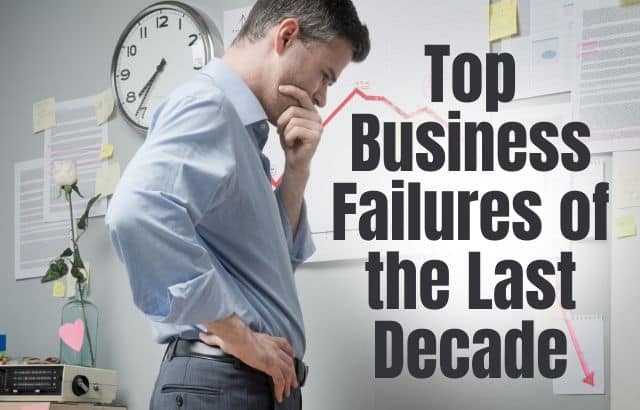Top Business Failures- In the ever-evolving world of business, failure is as much a part of the landscape as success. Over the last decade, we’ve seen companies rise rapidly only to fall even faster. The reasons range from misguided strategies to poor execution, shifting market conditions, and sometimes, a failure to listen to what the market truly needs. For aspiring entrepreneurs, understanding these stories can serve as powerful reminders of the obstacles and missteps to avoid on their path to success.
As Hirav Shah, global business advisor, often says, “Failure isn’t the end. It’s a chapter in your journey, teaching you to turn every setback into a setup for a comeback.” Let’s delve into some of the top business failures from the last ten years, unraveling the lessons they leave behind.
Table of Contents
Top Business Failures of the Last Decade: Lessons for Aspiring Entrepreneurs

1. Theranos – The Promise of Technology Without Proof
Theranos, founded by Elizabeth Holmes, was once heralded as a revolutionary healthcare company that claimed to diagnose hundreds of diseases with just a few drops of blood. Investors flocked to the idea, believing it would change medical diagnostics forever. However, it was later revealed that the technology didn’t work as claimed, leading to lawsuits and the company’s eventual collapse.
Lesson: Transparency and accountability are non-negotiable, especially when dealing with people’s health and well-being. Entrepreneurs must ensure their product works and can deliver on its promises before they market it.
Hirav Shah notes, “Innovation without integrity is bound to collapse. A good idea will only hold if backed by credibility and genuine results.”
2. Quibi – Betting Big Without Knowing the Audience
Quibi, the short-form streaming platform led by industry veterans Jeffrey Katzenberg and Meg Whitman, launched with a staggering $1.75 billion investment. The idea was to deliver “quick bites” of content designed for mobile devices. But despite the hype, Quibi failed to attract viewers and folded within six months of its launch. The reasons? High costs, low engagement, and a lack of understanding of the target audience’s preferences.
Lesson: Knowing your audience deeply is critical. It’s not enough to have an innovative concept; it must resonate with the people it’s intended for. Quibi’s story shows that a massive budget cannot replace market alignment.
As Hirav Shah advises, “Entrepreneurs need to empathize with their customers. Success lies in aligning your vision with their needs, not just with what looks exciting on paper.”
3. WeWork – The Cost of Rapid Expansion Without Stability
WeWork aimed to redefine office spaces by providing co-working environments with a community feel. Co-founder Adam Neumann had big dreams, but rapid expansion, exorbitant spending, and questionable leadership practices led to an unsustainable business model. In 2019, WeWork’s valuation plummeted from $47 billion to a near collapse, resulting in a failed IPO and a major shake-up in management.
Lesson: Growth must be sustainable and controlled. Rapid expansion can seem appealing, but without a solid foundation, it’s like building a skyscraper on sand. Entrepreneurs must ensure that growth aligns with business fundamentals and long-term viability.
“In business, pace yourself,” Hirav Shah emphasizes. “The dream may be big, but every step has to be firmly grounded in reality. Expansion without balance is simply ambition without a plan.”
4. Toys “R” Us – Ignoring Digital Transformation in Retail
Once a beloved toy store for generations, Toys “R” Us filed for bankruptcy in 2017. While it was burdened with debt, a key factor in its decline was its failure to keep up with digital trends. As competitors moved to e-commerce, Toys “R” Us was left behind, struggling to connect with a new generation of shoppers who preferred online shopping.
Lesson: Adapting to change is essential. In today’s business landscape, innovation and flexibility are non-negotiable. Entrepreneurs must stay vigilant about industry trends, especially digital transformations that reshape consumer behavior.
“If you aren’t evolving, you’re eroding,” says Hirav Shah. “Your legacy means nothing if you can’t adapt to tomorrow’s market. The key is to embrace change, not resist it.”
5. Forever 21 – The Risk of Rapid Expansion in a Saturated Market
Forever 21 enjoyed immense popularity with its trendy, affordable fashion. However, its aggressive global expansion, over-reliance on the fast fashion model, and lack of brand evolution led to its bankruptcy filing in 2019. The fashion industry changed, with shoppers becoming more conscious of sustainability, a trend Forever 21 failed to address.
Lesson: Understanding market shifts and adapting accordingly is crucial. Expansion should be based on strong market demand and not just the pursuit of growth. Sustainability and brand relevance have become critical factors in consumer decisions.
Hirav Shah observes, “Growing too quickly can lead to blind spots. Know when to pause, reflect, and adapt your strategies, especially when market values shift. Sometimes, a strategic slowdown is the path to long-term success.”
6. Blockbuster – The Missed Opportunity of Digital Transformation
Blockbuster’s failure is often cited as a cautionary tale. At its peak, it dominated the video rental industry. However, it failed to adapt to the shift toward digital streaming, famously rejecting an offer to buy Netflix. As streaming became mainstream, Blockbuster’s physical rental model became obsolete, leading to its eventual demise.
Lesson: Ignoring technological advancements can be fatal for a business. Entrepreneurs need to stay ahead of the curve and anticipate where the industry is heading, or they risk getting left behind.
“Complacency is a business killer,” Hirav Shah warns. “One missed opportunity can define your future. Keep an eye on innovation, and don’t be afraid to pivot if it means survival.”
7. Juicero – Focusing on Technology Instead of Value
Juicero, a juicing startup, introduced a $400 machine designed to press juice packs. Despite significant funding, the company faced backlash when consumers realized they could squeeze the juice packs by hand, without the need for the pricey device. The product failed to address a real consumer need, leading to its quick demise.
Lesson: Just because something is technologically advanced doesn’t mean it adds value. Entrepreneurs should focus on solving real problems rather than creating unnecessary products.
“Value is the currency of success,” Hirav Shah reminds us. “If your innovation doesn’t make life easier, better, or more fulfilling, it’s not a product worth pursuing.”
8. J.C. Penney – Failing to Differentiate and Keep Up With Trends
JCPenney, a longstanding retail giant, struggled to keep up with the changing retail landscape. Failed attempts to rebrand and constant changes in leadership left customers confused and disengaged. Ultimately, the company couldn’t compete with e-commerce giants and filed for bankruptcy in 2020.
Lesson: Consistency and a clear brand identity are crucial. When trying to reinvent a business, it’s essential to understand your core customers and what keeps them loyal. Reinvention should be strategic, not reactive.
“Rebranding without a strategy is like wandering without a compass,” Hirav Shah says. “Change should be intentional and customer-focused. Your brand’s evolution must resonate with its roots.”
Conclusion
These stories of failure offer invaluable lessons for today’s entrepreneurs. They remind us that success in business is not just about innovation or ambition; it’s about timing, adaptability, understanding the customer, and maintaining a foundation of trust and authenticity.
“Failures are not roadblocks; they’re guideposts,” Hirav Shah advises. “Each failure is an invitation to reflect, learn, and grow stronger. True success is built on the wisdom gained from these setbacks.”
In the end, while these companies couldn’t find their way forward, they leave behind a wealth of insights for anyone hoping to make their mark in the business world. Failure may be daunting, but with the right mindset, every stumble becomes a stepping stone toward success.










